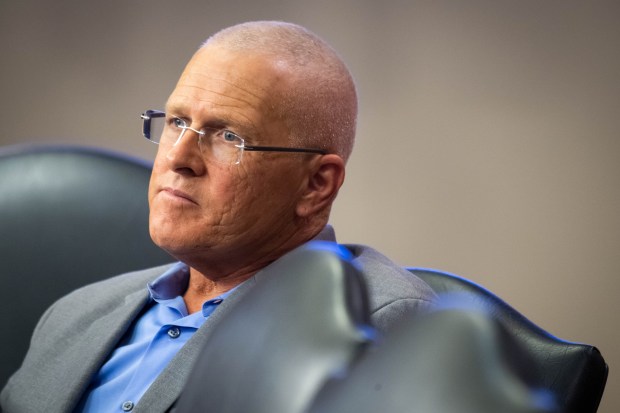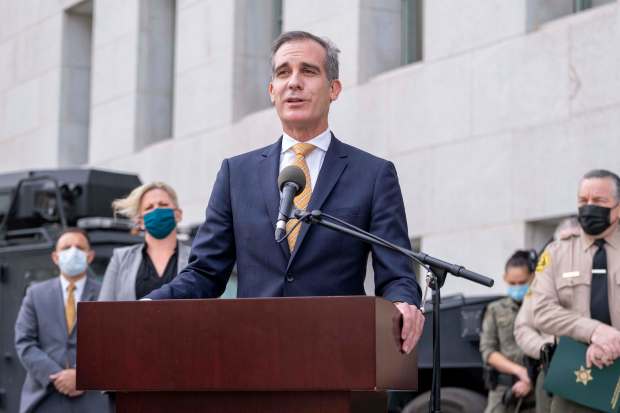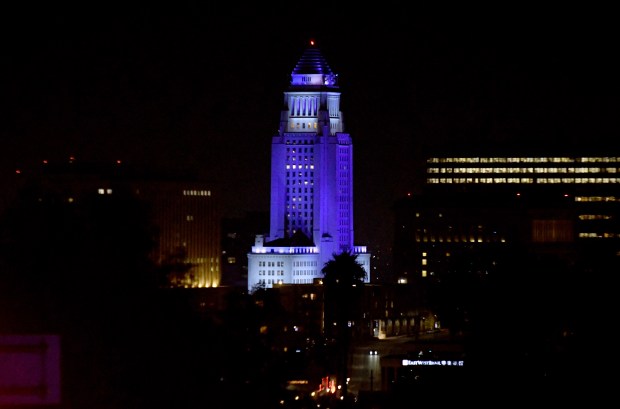The FBI probe into “pay-to-play” corruption at Los Angeles City Hall that has spilled into the open over the past two years has sparked some changes to ethics rules, especially around political contributions by developers.
The FBI investigation has forced the removal of former Councilman Jose Huizar from his perch at a downtown and East Los Angeles district. He has pleaded not guilty to charges of racketeering and bribery in a scheme often involving downtown developers.
Meanwhile, former Councilman Mitchell Englander, who stepped down abruptly at the start of 2019, has since pleaded guilty to trying to obstruct an FBI investigation and has been accused of receive envelopes of cash. He’s scheduled to be sentenced on Monday.
The probe has also led to cases against high-ranking staffers, lobbyists, developers and others.
In recent years, a handful of moves were made in an effort to rebuild trust in city officials — but the path has been been rocky and long.
In addition to ethics reform efforts often attracting little interest from Los Angeles City Council members, one of the few measures that was adopted — a ban on developer contributions — was found so wanting by proponents of ethics reform, those groups ended up strongly opposing the measure.
The developer contribution ban, passed more than a year ago in January 2020, will prohibit political campaign contributions by developers with projects that needed approval, starting in 2022. While the measure has the capacity to sound good to some, on a surface-level, it was criticized as having so many loopholes in it that some ethics reform groups said adopting the ban would be worse than doing nothing.
Groups including California Common Cause and the California Clean Money Campaign were among those that opposed the measure. They said that it would still allow developers to raise money for elected officials and candidates, often in much higher amounts than they could contribute directly to campaign war chests.
The developer ban also leaves out subcontractors, which often join the developers they work under to contribute to public officials, they said. At the time these groups recommended that the City Council retain what had originally been included with the recommendations that were modeled after 2011’s Measure H, which led to a ban on contributions from city contractors. Those recommendations were made by the City Ethics Commission, a panel made up of appointed members, but were changed once it was presented to the City Council.
While the scandal continues to touch former City Council members and high-ranking public officials who have been charged by federal prosecutors, and speculation abounds around current officials, there is expected to be little immediate movement to go beyond what has already been adopted.
Nevertheless, here are a few ideas that have been floated by ethics groups and some city leaders:
Allowing contributions only from people
Ethics and campaign finance reform groups in the past have encouraged city leaders to craft a local measure, modeled after those adopted in New York and San Francisco, that ban LLCs and LLPs, saying it can often be difficult to identify the owners of the companies making the contributions.
While this idea has not gained much traction, it is among recommendations made by the Ethics Commission, which has an investigative wing that audits and metes out penalties to individuals who flout ethics rules.
Publicly financed campaigns
The proposal to setting up a system that would allow candidates to have their campaigns publicly financed — usually after demonstrating they are viable candidates — has been around for years.
The point behind this idea is that candidates can spend less time fundraising and soliciting money to fuel the usually high expense of running a campaign, and spend more time talking to and engaging with voters. The theory is that would pull more of the focus of these potential city leaders toward the interests of their constituents, rather than those who came through with campaign funding.

The aim of such a program, which would set up a full publicly financed program that goes beyond the city’s existing matching funds program, would be to ensure that all candidates had a fair chance to launch an aggressive campaign, whether or not they have access to people or organizations with deep pockets.
This idea was proposed as far back as 2005, and studied, but not taken up.
Councilman Mike Bonin proposed the idea back in 2017 — incidentally, with a second from Huizar, who has since been arrested, suspended prematurely from his City Council post, and is now being charged with crimes connected with an alleged, wide-ranging corruption scheme.
In late 2019, Bonin revived the motion, with different seconders. But this idea, referred to the council’s Rules Committee, has not been touched since then.
Recusals
Several City Council members in August introduced a motion calling for recommendations on how the city would require city officials to recuse themselves from voting on matters affecting individuals or organizations donating to their campaigns.
This measure would be similar to the recusal rule that applies to board members of the Los Angeles Metropolitan Transportation Authority.
The concept behind this idea is that donors would be less likely to want to contribute to council members’ campaigns, if they know that that official would not be able to work and vote on, and to take part in discussing, the matter they have pending.

This motion, which appeared to receive the swift support of Mayor Eric Garcetti at the time, was quickly approved by the full City Council a couple months later. Now it’s up to the Ethics Commission to come back with their recommendations.
Lobbying
This is not one idea, but a set of recommendations that the Ethics Commission is presenting to other public officials, after renewed interest emerged in revamping lobbying rules.
The existing lobbying rules mostly date back to 1994. Interestingly, a set of recommendations to do a comprehensive updating of the rules were originally presented to the City Council in February 2018, after the commission conducted a labor-intensive, monthslong review process that involved public meetings and gathering extensive input.
The recommendations were never scheduled for a committee or City Council agenda, however. And after two years, they expired.

Could there be more interest now?
Some of the recommendations that previously failed to spark any interest from elected officials include changing the public disclosures of lobbying activity from every quarter, to become more frequent.
Ethics officials gave examples of other municipalities that require disclosures every two months, once a month and even weekly. They argued that in the current system, a lobbying effort could be disclosed four months after it was done. Within that span of time, the issue could have been initiated and then resolved, with the public being informed of the lobbying effort after the fact.
Another recommendation was to change up how someone qualifies as a lobbyist. Instead of using a time-based criteria that measures how much time someone spends influencing an official, a money-based system would measure how much money is spent.
The need to define when someone is a lobbyist is meant to acknowledge that not everyone who expends resources to engage with a public official should necessarily be considered a lobbyist.
Marching on
As a newly formed City Council, with three new members, gets its sea legs, the issue of ethics reform may not be occupying their minds just yet. The novel coronavirus understandably continues to take center stage, while the persistence of Los Angeles’s homelessness crisis presents a moral urgency to city leaders to act.
Still, the work of improving ethics rules appear to be continuing quietly, particularly on the Ethics Commission. This month, the panel held three meetings on the updating of lobbying reforms, a process that refreshes an earlier stalled attempt. But there are worries that the panel could have its work cut out for it, if fails to garner more attention — a form of capital that is even less available in these resource stretched time — for its efforts.
As one public speaker, Rob Quan of UnrigLA, expressed to the panel last month, very few people are realistically able to attend the meetings due to it being timed on Tuesday mornings, which coincides with the City Council, the Police Commission and the County Board of Supervisors meetings.
It was his third attempt, he said, to appeal the commission for what he considers to be a simple matter.
“For a commission where the worst thing that could happen is, nobody knows what you’re doing, and nobody listens to your proposals — you ensure that by having Tuesday, 9:30 a.m. meetings,” he said.
It makes little sense, Quan said, to make meetings difficult to attend “when you’re trying to get interested parties, and activists who have other things happening at this exact same time … It makes no sense when we’re trying to garner media when there is something of importance, it makes no sense if you’re trying to get council members or their staff to actually turn out, like we have tried in the past to some success, but half the time, to have something important happening at council.”
Right after his comment, Quan hopped off the call to attend the City Council meeting which was just getting started. And not long after that, the commissioners said they planned to take a survey of their members’ availability, and to potentially take up setting a new schedule at their February meeting.
